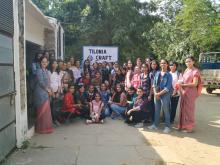VISIT TO BAREFOOT COLLEGE, TILONIA

The Department of Economics, The IIS University conducted a field visit to Barefoot College, Tilonia for students of undergraduate and post graduate. The aim of the visit was to environmentally analyse the team work, other positive traits as well as academic excellence through innovative technology and methodology such as Solar Plants, Biogas Plants, Drip Irrigation etc.
About Barefoot College
The Barefoot College, also known as the ‘Social Work & Research Centre’ is located in a remote village called Tilonia at the outskirts of Ajmer district in Rajasthan. This is a voluntary organization which began in the year 1972 under the leadership of Mr Bunker Roy. At the outset it was initiated mainly on the issues of drinking water in a block called Kishangarh.
It is a Voluntary Organization working in the areas of skill development, solar energy, women empowerment, handicraft. The programs run by this college are influenced by the Gandhian philosophy of Gram Swaraj (Village Self-rule) for each village. Also with a geographic focus on the least developed countries, the college train women worldwide as solar engineers, innovators and educators, who then return to their villages to bring light and learning to their community. The institutional structure of Barefoot College consists of four major departments – Solar, Education, Communication and Empowerment. Trainees visited all the four departments to understand the holistic village development model followed by Barefoot College.
This institution believes in imparting informal, non-structured, on-the-job practical training by identifying the poor, unemployed youth who have been unable to finish their formal education and have returned to their respective villages as dropouts.
The five principles which are an integral part of the functioning of the college are equality, collectiveness, self-reliance, decentralization and austerity. The education programs there focus on the overall development of rural children, with literacy being just one part of it. It encourages hands-on or learning-by-doing process of gaining knowledge and skills. Lessons are focused on awareness about the environment and socio-economic and political forces that dominate development. The aim is to provide the children with a right balance of education and literacy so that they choose to stay in their village and work for its development. The college has different programs for children.
THE VISIT
Students were also shown the art of puppetry and how people are trained to portray the importance of skill based learning by the art of puppet shows. Students were also made familiar with some of their most famous puppet characters and also how the people there have prepared some acts to describe the journey of the Barefoot College to the guests and visitors there.
After enhancing their knowledge about the traditional art and uses of puppetry, students were taken to the factory where all the handicrafts were being prepared. Proper knowledge about the machines and materials and the manufacturing process was being provided to the students. After this session students were taken to thesolar department where a workshop on photo voltaic cells was going on. Women trainees (popularly known as Solar mamas) from 12 countries viz. Mexico, Syria, Senegal , Madagascar, Bali, Somalia, Kiribati etc. were receiving training on solar components. Pokhar Mal Ji explained, “Barefoot college provides training in solar lighting, solar water heaters, parabolic solar cookers and solar powered water desalination technology addressing the energy needs of people where electricity doesn’t reach. Trainees are often illiterate or semi-literate middle-aged women from rural villages worldwide who are trained to become solar engineers.”
Students were taken to the Tilonia craft shop (handicraft emporium) showcasing a variety of traditional decorative pillows, bedspreads, paper books, quilts and duvet covers. Emporium manager explained students about different types of traditional arts used in making items here and that all the items are handmade, produced in house by rural women artisans. He said “The purpose behind setting up such type of emporium is that we wanted to empower the rural women and make them self-reliant. During our audits in nearby areas we found that rural women are capable of making creative products if given proper training and support. Thus we started a handicraft center for training and sales purpose and now you can see women are creating wonders.”
Also the unit where sustainable sanitary pads are made was a nice experience to come across as it taught the students that how by using environmental friendly things they have surpassed some developed cities as well in their thought process. We also met a lady who has never ever attended school and still can perform some major dental procedures just be watching and learning experts.
WHAT WE LEARNT?
Everyone seemed inspired from Solar Mamas and are keen to replicate such type of training in every village to achieve high levels in terms of growth.
The concept of night schools for children who are not able to attend school during the day due to family responsibilities such as farming, livestock breeding also fascinated the students.
Also the method by which water heaters and solar panels are made at such a low cost can be really helpful to substitute expensive equipments.
Thus our visit to Tilonia Barefoot College was an overwhelming experience and an eye opener about rural development and women empowerment.

